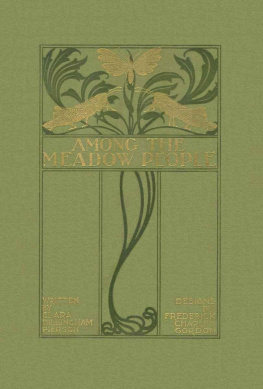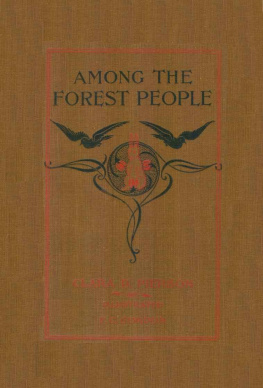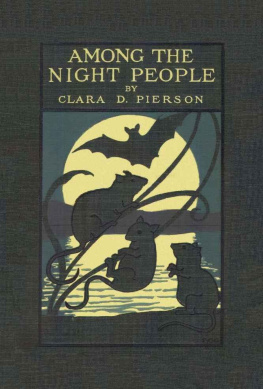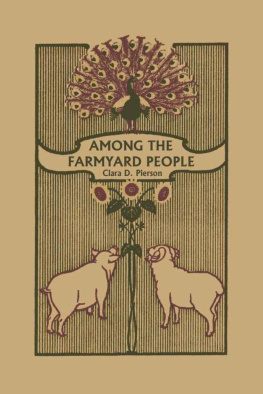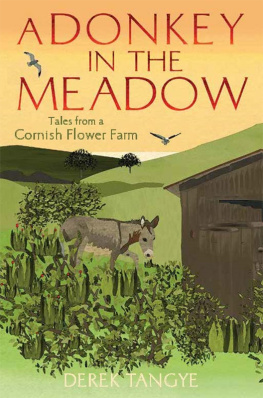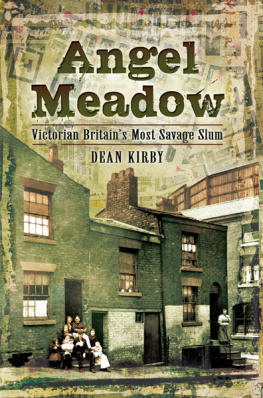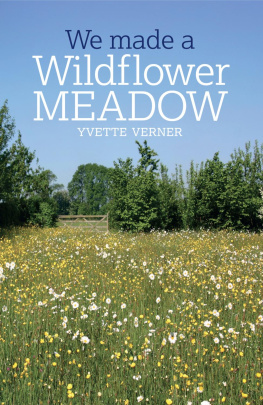Among the Meadow People
by
Clara Dillingham Pierson
Yesterday's Classics
Chapel Hill, North Carolina
Cover and Arrangement 2010 Yesterday's Classics, LLC
All rights reserved. No part of this book may be reproduced or retransmitted in any form or by any means without the written permission of the publisher.
This edition, first published in 2010 by Yesterday's Classics, an imprint of Yesterday's Classics, LLC, is an unabridged republication of the work originally published by E. P. Dutton & Company in 1901. This title is available in a print edition (ISBN 978-1-59915-019-2).
Yesterday's Classics, LLC
PO Box 3418
Chapel Hill, NC 27515
Yesterday's Classics
Yesterday's Classics republishes classic books for children from the golden age of children's literature, the era from 1880 to 1920. Many of our titles are offered in high-quality paperback editions, with text cast in modern easy-to-read type for today's readers. The illustrations from the original volumes are included except in those few cases where the quality of the original images is too low to make their reproduction feasible. Unless specified otherwise, color illustrations in the original volumes are rendered in black and white in our print editions.
Introduction
Many of these stories of field life were written for the little ones of my kindergarten, and they gave so much pleasure, and aroused such a new interest in "the meadow people," that it has seemed wise to collect and add to the original number and send them out to a larger circle of boys and girls.
All mothers and teachers hear the cry for "just one more," and find that there are times when the bewitching tales of animals, fairies, and "really truly" children are all exhausted, and tired imagination will not supply another. In selecting the tiny creatures of field and garden for the characters in this book, I have remembered with pleasure the way in which my loyal pupils befriended stray crickets and grasshoppers, their intense appreciation of the new realm of fancy and observation, and the eagerness and attention with which they sought Mother Nature, the most wonderful and tireless of all story-tellers.
Your friend,
C LARA D. P IERSON.
S TANTON, M ICHIGAN,
April 8th, 1897.
Contents
A S the warm August days came, Mr. Yellow Butterfly wriggled and pushed in his snug little green chrysalis and wished he could get out to see the world. He remembered the days when he was a hairy little Caterpillar, crawling slowly over grass and leaves, and he remembered how beautiful the sky and all the flowers were. Then he thought of the new wings which had been growing from his back, and he tried to move them, just to see how it would feel. He had only six legs since his wings grew, and he missed all the sticky feet which he had to give up when he began to change into a Butterfly.
The more he thought about it the more he squirmed, until suddenly he heard a faint little sound, too faint for larger people to hear, and found a tiny slit in the wall of his chrysalis. It was such a dainty green chrysalis with white wrinkles, that it seemed almost a pity to have it break. Still it had held him for eight days already and that was as long as any of his family ever hung in the chrysalis, so it was quite time for it to be torn open and left empty. Mr. Yellow Butterfly belonged to the second brood that had hatched that year and he wanted to be out while the days were still fine and hot. Now he crawled out of the newly-opened doorway to take his first flight.
Poor Mr. Butterfly! He found his wings so wet and crinkled that they wouldn't work at all, so he had to sit quietly in the sunshine all day drying them. And just as they got big, and smooth, and dry, it grew dark, and Mr. Butterfly had to crawl under a leaf to sleep.
The next morning, bright and early, he flew away to visit the flowers. First, he stopped to see the Daisies by the roadside. They were all dancing in the wind, and their bright faces looked as cheerful as anyone could wish. They were glad to see Mr. Butterfly, and wished him to stay all day with them. He said: "You are very kind, but I really couldn't think of doing it. You must excuse my saying it, but I am surprised to think you will grow here. It is very dusty and dry, and then there is no shade. I am sure I could have chosen a better place."
The Daisies smiled and nodded to each other, saying, "This is the kind of place we were made for, that's all."
Mr. Butterfly shook his head very doubtfully, and then bade them a polite "Good-morning," and flew away to call on the Cardinals.
The Cardinals are a very stately family, as everybody knows. They hold their heads very high, and never make deep bows, even to the wind, but for all that they are a very pleasant family to meet. They gave Mr. Butterfly a dainty lunch of honey, and seemed much pleased when he told them how beautiful the river looked in the sunlight.
"It is a delightful place to grow," said they.
"Ye-es," said Mr. Butterfly, "it is very pretty, still I do not think it can be healthful. I really cannot understand why you flowers choose such strange homes. Now, there are the Daisies, where I just called. They are in a dusty, dry place, where there is no shade at all. I spoke to them about it, and they acted quite uppish."
"But the Daisies always do choose such places," said the Cardinals.
"And your family," said Mr. Butterfly, "have lived so long in wet places that it is a wonder you are alive. Your color is good, but to stand with one's roots in water all the time! It is shocking."
"Cardinals and Butterflies live differently," said the flowers. "Good-morning."
Mr. Butterfly left the river and flew over to the woods. He was very much out of patience. He was so angry that his feelers quivered, and now you know how angry he must have been. He knew that the Violets were a very agreeable family, who never put on airs, so he went at once to them.
He had barely said "Good-morning" to them when he began to explain what had displeased him.
"To think," he said, "what notions some flowers have! Now you have a pleasant home here in the edge of the woods. I have been telling the Daisies and the Cardinals that they should grow in such a place, but they wouldn't listen to me. The Daisies were quite uppish about it, and the Cardinals were very stiff."
"My dear friend," answered a Violet, "they could never live if they moved up into our neighborhood. Every flower has his own place in this world, and is happiest in that place. Everything has its own place and its own work, and every flower that is wise will stay in the place for which it was intended. You were exceedingly kind to want to help the flowers, but suppose they had been telling you what to do. Suppose the Cardinals had told you that flying around was not good for your health, and that to be truly well you ought to grow planted with your legs in the mud and water."
"Oh!" said Mr. Butterfly, "Oh! I never thought of that. Perhaps Butterflies don't know everything."
"No," said the Violet, "they don't know everything, and you haven't been out of your chrysalis very long. But those who are ready to learn can always find someone to tell them. Won't you eat some honey?"
And Mr. Butterfly sipped honey and was happy.

